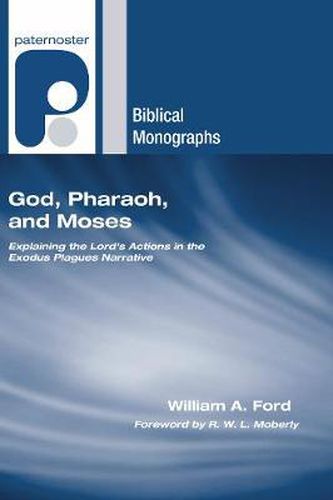Readings Newsletter
Become a Readings Member to make your shopping experience even easier.
Sign in or sign up for free!
You’re not far away from qualifying for FREE standard shipping within Australia
You’ve qualified for FREE standard shipping within Australia
The cart is loading…






The story of the Exodus from Egypt is of fundamental importance, both in the Old Testament and beyond. However, it also contains issues that are theologically problematic for many readers, especially concerning the actions of God. Why does God send a series of devastating plagues on Egypt? How do we understand the hardening of Pharaoh’s heart? What do the answers to these questions say about the character of God? This study addresses these questions, taking into account the complex interaction of the presuppositions of faith and responsible textual interpretation. The approach is narrative-theological and canonical–reading the story in its current form as a story, and concentrating on the various passages within the story that appear to present rationales for God’s actions (especially Exodus 9:13-19 and 10:1-2). By reading these explanations in their context within the story, and paying attention to such factors as speaker, addressee, purpose, and reception, a picture is built up of the different and developing relationships between God, Pharaoh, and Moses. This complex interaction provides a way to read and understand the wider plagues story, including the plagues and hardening of the heart within it. The study concludes by considering another story with a similarly difficult portrayal of God’s actions–the story of the capture of the Ark in 1 Samuel 4-7, where a similar pattern can be observed. The picture that emerges is challenging rather than comfortable–a God who is responsive, speaking and acting to confront others to make the appropriate response to him.
$9.00 standard shipping within Australia
FREE standard shipping within Australia for orders over $100.00
Express & International shipping calculated at checkout
The story of the Exodus from Egypt is of fundamental importance, both in the Old Testament and beyond. However, it also contains issues that are theologically problematic for many readers, especially concerning the actions of God. Why does God send a series of devastating plagues on Egypt? How do we understand the hardening of Pharaoh’s heart? What do the answers to these questions say about the character of God? This study addresses these questions, taking into account the complex interaction of the presuppositions of faith and responsible textual interpretation. The approach is narrative-theological and canonical–reading the story in its current form as a story, and concentrating on the various passages within the story that appear to present rationales for God’s actions (especially Exodus 9:13-19 and 10:1-2). By reading these explanations in their context within the story, and paying attention to such factors as speaker, addressee, purpose, and reception, a picture is built up of the different and developing relationships between God, Pharaoh, and Moses. This complex interaction provides a way to read and understand the wider plagues story, including the plagues and hardening of the heart within it. The study concludes by considering another story with a similarly difficult portrayal of God’s actions–the story of the capture of the Ark in 1 Samuel 4-7, where a similar pattern can be observed. The picture that emerges is challenging rather than comfortable–a God who is responsive, speaking and acting to confront others to make the appropriate response to him.